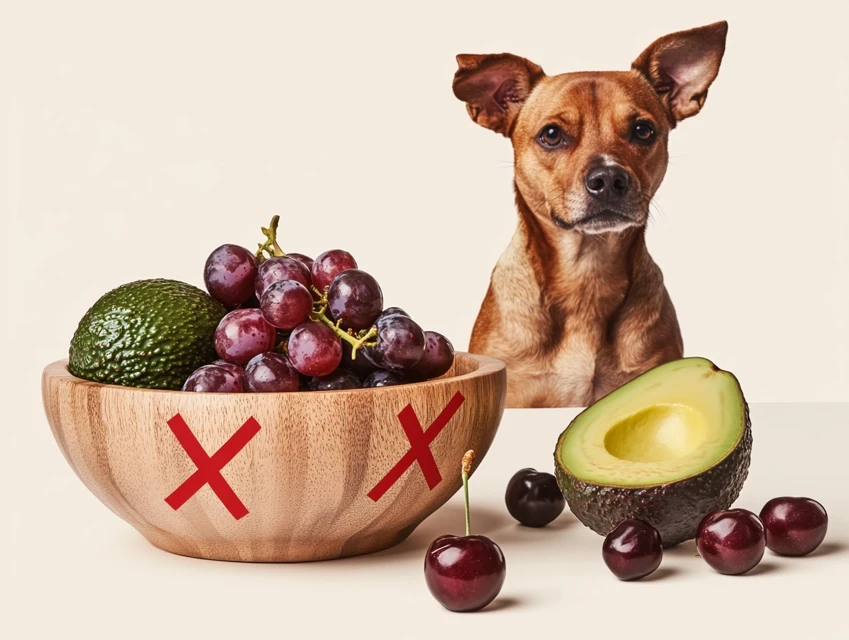Can dogs eat fruits? It’s a question many pet owners ask when considering sharing a snack with their furry companions. While some fruits provide excellent nutritional benefits for dogs, others can be harmful or even toxic. This guide will explore can dogs eat fruits safely, highlighting the best options, which ones to avoid, and how to serve them properly. Let’s dive into why fruits can be a healthy addition to your dog’s diet!
Why Fruits Can Be a Healthy Treat for Dogs
Nutritional Benefits of Fruits for Dogs
Fruits can provide a burst of vitamins, minerals, and antioxidants that help keep your dog’s coat shiny, their immune system strong, and their digestive system running smoothly. For instance, blueberries are known for their high antioxidant content, while apples bring a good dose of fiber and vitamin C to the table. These natural goodies can complement your dog’s diet, giving them a tasty treat that’s also good for their health.
When Fruits Are a Good Supplement to a Dog’s Diet
Dogs don’t need fruits as a primary food source, but they can enjoy them in moderation as an occasional treat. Fruits are far better than processed snacks, which often contain artificial additives. However, it’s essential to introduce fruits gradually to avoid upsetting their stomach. Keep in mind that not every fruit is created equal—some are great, but others can cause serious harm.
Want to know which fruits are safe and which ones to steer clear of? The AKC’s guide to safe fruits is an excellent resource for pet owners who want to make informed choices.
Fruits Dogs Can Safely Eat
Apples
Apples are a crunchy and nutritious snack for dogs. Packed with fiber and vitamin C, they support digestion and overall health. But, remember to remove the seeds and core—those contain traces of cyanide, which can be toxic to dogs. Serve them sliced or diced for easy munching, for more details about this element , read a previous article on our blog where we answered the question: Can dogs eat apples?
Bananas
If you’re looking for a quick and easy treat, bananas are a fantastic option. They’re loaded with potassium, which helps maintain strong muscles and nerve functions. However, due to their high sugar content, bananas should be given sparingly. A few small slices now and then are plenty.
Blueberries
Tiny but mighty, blueberries are often called a superfood for a reason. They’re rich in antioxidants, which help combat oxidative stress and support a healthy immune system. Serve them fresh or frozen as a refreshing snack during the summer.
Watermelon
Watermelon is a hydrating treat that’s perfect for hot days. It’s low in calories and full of water, making it a guilt-free snack. But, make sure it’s seedless and that you’ve removed the rind, as both can cause digestive issues.
More Safe Fruits for Dogs
In addition to the above, dogs can safely enjoy strawberries, pears, and oranges. Each of these fruits provides unique benefits, but always serve them in moderation and remove any seeds or pits to avoid choking hazards.
Looking for more details about how to safely serve fruits to dogs? The Pet Poison Helpline offers valuable insights into which foods are safe and which are harmful.
Fruits Dogs Should Never Eat
Grapes and Raisins
Grapes and raisins might seem harmless, but they are extremely toxic to dogs. Even small amounts can lead to kidney failure. Symptoms like vomiting, lethargy, and loss of appetite can appear quickly, so it’s crucial to keep these fruits completely out of reach.
Avocado
Avocados contain persin, a toxin that can cause stomach upset in dogs. While the flesh of the avocado is less toxic, the pit and skin pose choking hazards and toxicity risks. It’s best to avoid giving avocado to your pup entirely.

Cherries
Cherries are another fruit to avoid. Their pits not only pose a choking hazard but also contain cyanide, which is poisonous to dogs. Even without the pits, cherries are not worth the risk due to their high sugar content and potential to upset a dog’s stomach.
Citrus Fruits
Citrus fruits like lemons, limes, and grapefruits are highly acidic. While a small lick likely won’t hurt your dog, eating these fruits can cause vomiting or diarrhea. Stick to less acidic options like oranges if you want to include citrus in your dog’s diet.
More Harmful Fruits
Other fruits to watch out for include unripe tomatoes and certain wild berries, which can be toxic. Always double-check with your veterinarian if you’re unsure about a particular fruit.
To stay updated on fruits and foods toxic to dogs, visit the Veterinary Partner, a trusted source for pet health information.
How to Serve Fruits to Dogs Safely
Proper Washing and Preparation
Before giving any fruit to your dog, always wash it thoroughly. Fruits often carry pesticides, dirt, or bacteria that can harm your dog. Slice fruits into small, bite-sized pieces to avoid choking hazards and make them easier for your pup to eat.
Portion Control and Avoiding Overfeeding
While fruits are healthy, they should only make up a small portion of your dog’s overall diet—around 10%. Overfeeding can lead to upset stomachs, diarrhea, or even weight gain. Moderation is key when introducing fruits as treats.
Signs of Allergies or Intolerance in Dogs
When offering a fruit for the first time, keep an eye on your dog for signs of an allergic reaction or intolerance. Symptoms like vomiting, diarrhea, excessive itching, or swelling can indicate that the fruit isn’t suitable. If you notice these signs, stop feeding the fruit immediately and consult your vet.
Making fruits a safe and enjoyable treat for your dog involves care and attention. If you’re ever unsure about how much fruit is safe or how to prepare it.
Special Cases and Exceptions
Can Puppies Eat Fruits?
Yes, but only in small amounts and under close supervision. Puppies have sensitive digestive systems, so introducing fruits gradually is essential. Start with dog-safe options like bananas or apples, ensuring they’re properly prepared. Always consult your vet before offering new foods to a puppy.
What About Dogs with Health Issues?
Dogs with specific health conditions, such as diabetes or obesity, may need extra precautions when it comes to fruits. High-sugar fruits like bananas or watermelon might not be suitable for diabetic dogs. Similarly, dogs with sensitive stomachs might struggle to digest acidic fruits like oranges. Your veterinarian can help tailor your dog’s diet to their unique needs.
Including fruits in your dog’s diet is not a one-size-fits-all approach, so it’s always better to err on the side of caution. For detailed advice on managing your dog’s diet with health conditions, consult resources like the Veterinary Partner.
Part 6: FAQs About Dogs and Fruits
Can Dogs Eat Pineapple?
Yes, in moderation! Pineapple is rich in vitamins and contains enzymes that aid digestion. However, it’s high in natural sugars, so only offer small chunks as an occasional treat. Always remove the tough skin and core before serving.
Are Apples Safe for Dogs with Sensitive Stomachs?
Generally, yes. Apples are mild and easy to digest for most dogs. However, if your dog has a sensitive stomach, peel the apple to reduce fiber content and offer only a small portion to start.
Is It Okay to Give Dogs Dried Fruits?
Dried fruits like raisins are a big no-no because they can be toxic. Even dried versions of safe fruits, like apples, should be avoided due to their concentrated sugar content, which can be hard for dogs to digest.
How Often Should I Feed My Dog Fruits?
Fruits should be treated as an occasional snack rather than a daily staple. A few times a week is enough, and remember to keep portions small to prevent overfeeding.
Can Dogs Eat Fruit Skins and Seeds?
No, it’s best to avoid skins and seeds. Many fruit skins, such as apple peels, can be tough to digest. Seeds from fruits like apples and cherries are toxic and pose a choking hazard.
If you’re still unsure about which fruits are suitable or how much to serve, the Pet Poison Helpline is an excellent resource for pet owners looking to keep their dogs safe and healthy.
Final Thoughts on Fruits in a Dog’s Diet
Feeding fruits to your furry friend can be a rewarding way to provide a natural and healthy treat, but it’s crucial to make informed decisions. Stick to dog-safe fruits like apples, blueberries, and watermelon while avoiding toxic ones like grapes, raisins, and cherries. Always serve fruits in moderation and prepare them carefully by washing, peeling, and removing any seeds or pits.
Remember, every dog is unique, and what works for one might not work for another. If you’re introducing a new fruit, observe your dog for any adverse reactions and consult your veterinarian when in doubt. With a little care and knowledge, you can share the joy of fruits with your pup while keeping them safe and happy.
For more detailed guidance on safe fruits and other foods for dogs, visit the American Kennel Club’s guide or check with your vet for personalized advice.
